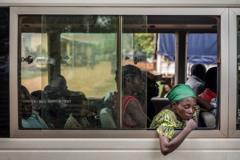For years, the plight of refugees worldwide has captivated attention, yet recent shifts in the US immigration policy have sparked controversy and unrest. As the US government extends a warm reception specifically to white South African refugees amidst growing tensions, other refugees from war-torn regions, such as the Democratic Republic of Congo (DRC), are left in a state of despair.
Consider Pacito, a refugee from the DRC. He and his family were moments away from boarding a flight to the US when their resettlement was abruptly canceled in early January. At the time, they were in Kenya, seeking safety after fleeing violence and instability back home. The abrupt suspension of refugee admissions came as a shock, shattering hopes they had built over years of preparation and vetting.
"There are 120,000 refugees who went through the whole process, the vetting, the security, the medical screenings. We've waited for years, but now these [Afrikaners] are just processed in like three months," Pacito expressed, echoing the sentiments of many in similar predicaments.
In contrast, the Trump administration recently signed an executive order prioritizing the entrance of white South African Afrikaners, identifying them as victims of alleged "racial discrimination." Their arrivals have been accompanied by solemn ceremonies, further exacerbating the feelings of despair among those relegated to the sidelines of a new, polarized system.
Critics point to the stark disparity in how refugee statuses are granted, emphasizing that every case should be evaluated based on credible evidence of persecution. Timothy Young of the Global Refuge organization articulates that there is ample evidence of suffering in communities around the world, particularly among groups in conflict zones like the DRC and Gaza.
In Gaza, the Hammad family echoes Pacito's frustrations as they await news after being denied entry to the US. They can't make sense of why attention has turned to the plight of white South Africans while they, too, live with the ongoing violence and uncertainty of their homeland.
As refugees like Pacito and the Hammad family navigate the bleak realities of their circumstances, the need for a more equitable refugee policy becomes increasingly apparent. With their futures hanging in the balance, many are compelled to confront an unsettling truth: the road to safety and dignity is not equally accessible to all. While some are celebrated as victims worthy of refuge, others languish in waiting, unsure of what's next.






















